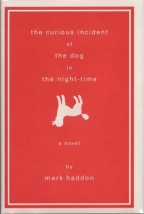the curious incident of the dog in the night-time
Mark Haddon
Doubleday /Random House
US Hardcover First
ISBN 0-385-50945-6
Publication Date: 06-17-2003
226 Pages; $22.95
Date Reviewed: 07-07-03
Reviewed by: Rick Kleffel © 2003

REFERENCES
COLUMNS
|
|
|
the curious incident of the dog in the night-timeMark HaddonDoubleday /Random HouseUS Hardcover FirstISBN 0-385-50945-6Publication Date: 06-17-2003226 Pages; $22.95Date Reviewed: 07-07-03Reviewed by: Rick Kleffel © 2003 |
|
|
REFERENCES |
COLUMNS |
Christopher John Francis Boone is fifteen years old, autistic and a budding journalist. He's a genius at math and physics but is unable to comprehend human emotions. As channeled by Mark Haddon, he's the ideal narrator for a unique novel of crime and detection, 'the curious incident of the dog in the night-time'. With simple language, Haddon creates a complex portrait of suburban life. Christopher may not be able to comprehend emotions but he can certainly observe them. His inability to achieve an emotional connection with those around him enables to the reader to experience his world directly, without intervention. Christopher's investigation into the events in his neighborhood becomes an anthropological examination of modern mores. Haddon manages to be heart rending and hilarious in the same sentence. It's remarkably clever, but never too clever. Occasionally, Christopher just has to lie down and scream.
Writers from Henry James to Arthur Machen to Daniel Keyes have used the voice of an innocent to explore evil. Haddon brings the latest clinical understanding of autism and Asperger's Syndrome to this novel with very impressive results. Christopher Boon is prone to walks at night when he can't sleep. One night, he finds the neighbor's dog, killed with a gardener's fork. A fan of Doyle's hero Holmes, he decides to conduct his own investigation. Doing so will unravel life as he knows it.
Haddon has a precise command of the simple power of language. Christopher's narrative isn't at all straightforward, but the detours he takes are fascinating and evocative, fractal reflections of events that are clearly beyond the ken of the speaker. Moreover, Christopher's realizations of concepts we take for granted are both pithy and funny. For example, early in the narrative Christopher talks about prime numbers, because as a math savant he knows every prime number up to 7,057. "The rule for working out prime numbers is really simple, but no one has ever worked out a simple formula for telling you whether a very big number is a prime number or what the next one will be.... Prime numbers are what is left when you have taken all the patterns away. I think prime numbers are like life. They are very logical, but you could never work out all the rules, even if you spent all your time thinking about them." Haddon includes lots of entertaining and nicely drawn diagrams to accompany Christopher's asides. They're definitely an appealing part of the novel.
But as Christopher's investigation takes one unexpected turn after another, the boy himself grows. Though the changes are tiny, they seem startling and significant in the restricted scope of the story. Haddon is careful to ratchet back the growth, however. He doesn't give the dysfunctional child a miracle cure. It's up to the reader to decode and note Christopher's reports of the times that he simply lies down and screams, or rocks and groans quietly to himself. It takes an effort to cast one's self out of the child's viewpoint and remember that these behaviors, which may last for hours, cause parents and those around Christopher tremendous discomfort and upset even though they're just another simple event as dispassionately rendered by Christopher.
Haddon's novel takes the reader on a fascinating, funny and emotionally wrenching journey in an unexpected direction as Christopher continues his investigation. He uses all the tools of detection in a naïve fashion that seems refreshingly pure. The mystery here isn't what we expect it to be, which means that it lives up to its genre. But 'the curious incident of the dog in the night-time' is not a genre-bound mystery. It has all the elements that make great fiction; it's the kind of novel that deserves to be a bestseller because it has a wide potential appeal. It has something else beyond that. Haddon's novel is the kind of book that you can pick up in your local independent bookstore and read ten pages before you know it. Nothing will serve the reader better than to actually read the novel itself. It's that simple.